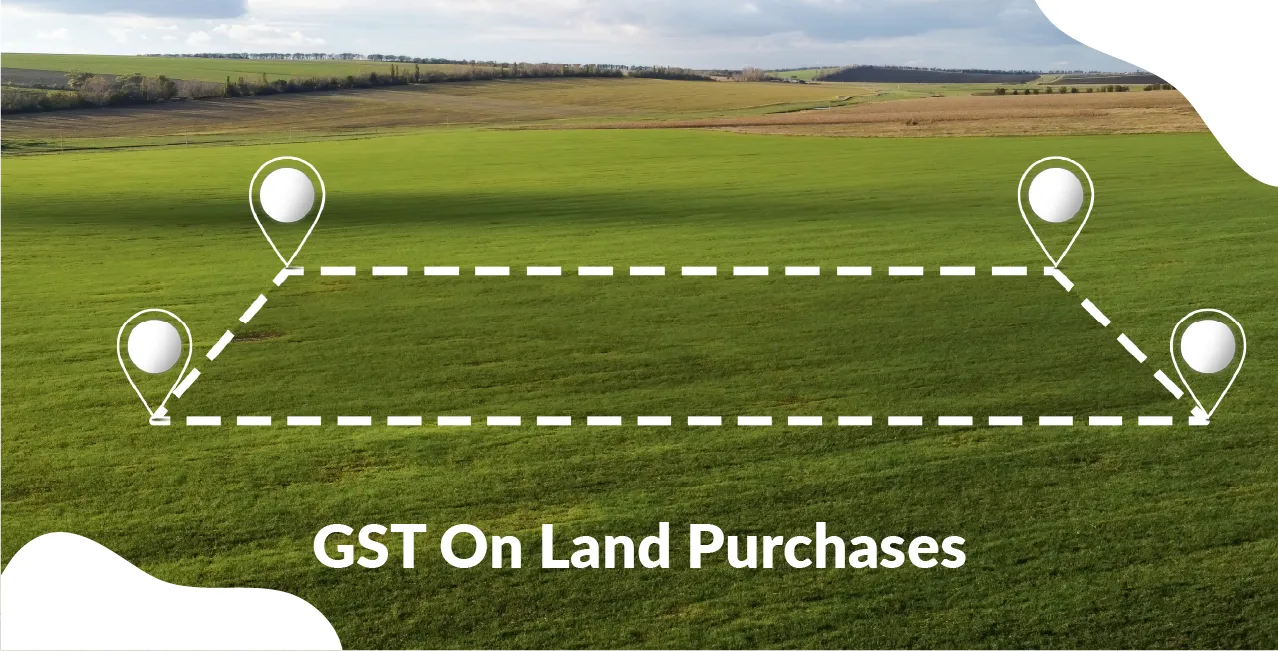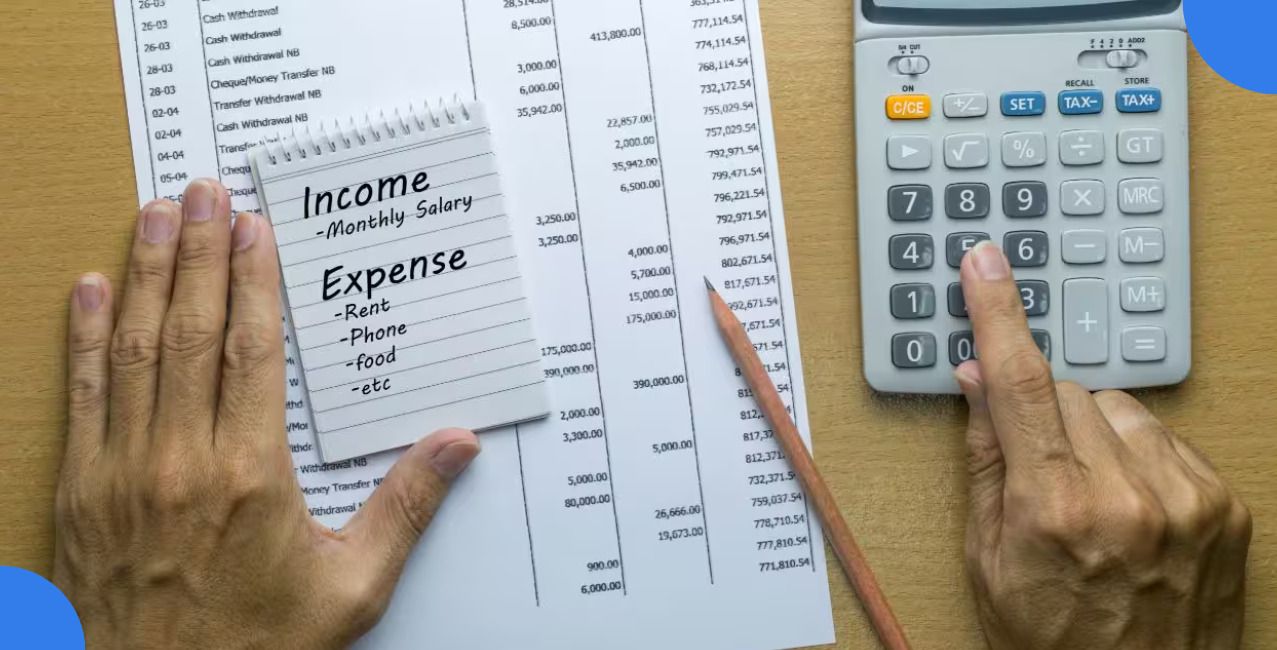GST On Land Purchases – Tax Rules, Rates & Input Credit

Check Your Loan Eligibility Now
By continuing, you agree to LoansJagat's Credit Report Terms of Use, Terms and Conditions, Privacy Policy, and authorize contact via Call, SMS, Email, or WhatsApp
GST, or Goods and Services Tax, is a single indirect tax applied to the supply of goods and services in India. It does not directly apply to the sale of land as it is not considered a "good" or "service."
However, GST may apply to related services. For example, if you buy a plot in a housing project under construction, GST is charged on the construction service, not on the land itself. Let's say you buy a flat for ₹50,00,000, and ₹20,00,000 for construction. GST is charged only on ₹20,00,000, not the land value.
GST Applicability on Developed Plots of Land
GST does not apply when buying vacant land alone. However, if the transaction includes an immovable property (such as land with a house) or is part of a composite supply (e.g., land plus construction), then GST may apply.
Key points:
- Buying vacant land? No GST—just stamp duty.
- Purchasing land with construction, whether under construction or ready-to-move? GST applies to the built portion.
- For affordable housing, a lower 1% rate applies to under-construction properties; otherwise, it’s typically 5% or 18%.
- Completed properties (with a certificate) are GST-exempt.
Always check whether the land transaction includes construction or amenities to determine GST liability.
Is There an HSN Code for Land Purchase?
When buying land in India, you may wonder if an HSN (Harmonised System of Nomenclature) code is required. The answer is clear—there is no HSN code for land purchase.
Under Schedule III of the CGST Act, the sale of land is neither a supply of goods nor a supply of services. Since land is an immovable property and not a taxable supply, GST does not apply, and therefore, no HSN code is assigned for such transactions.
However, the situation changes if the land is sold with added features like internal roads, streetlights, drainage systems, or boundary walls. These additions are considered development services, and in such cases, GST applies only to the service portion.
Here’s a comparison to make it clearer:
Why Does the Government Not Charge GST on Land Purchase?
The government does not charge GST on land purchase because land is not considered a supply of goods or services under the Goods and Services Tax (GST) law. As per Schedule III of the CGST Act, the sale of land is treated as a transfer of immovable property, not a commercial supply.
Here are the key reasons:
Land is immovable property:
GST is designed to apply to the supply of goods and services. Land is neither—it is a static, physical asset and thus falls outside GST’s scope.
Avoid double taxation:
Buyers already pay stamp duty and registration charges on land purchases. If GST were also applied, it would result in double taxation, increasing the financial burden.
Encourage investment and housing:
By keeping land outside GST, the government aims to support real estate growth, encourage infrastructure development, and make housing more affordable.
Impact of GST on the Land Industry
The introduction of GST in India brought major changes across industries, but its impact on the land sector has been limited yet important.
Since the sale of land is not taxed under GST, most land deals are still governed by stamp duty and registration charges. However, GST does impact the industry indirectly, especially when land is developed and sold with services, like roads, drainage, or electricity connections.
This means that developers selling plotted developments must now charge GST on the service portion of the sale. As a result, buyers may pay more than before, and developers must maintain proper records to separate land value from service value.
Example:
A developer sells a plot for ₹12,00,000:
- ₹10,00,000 is for land (no GST)
- ₹2,00,000 is for development (amenities)
GST at 18% on ₹2,00,000 = ₹36,000
GST has made land development more structured, but also slightly more expensive for buyers when services are included.
Input Tax Credit on Land Purchase
Under the GST system, Input Tax Credit (ITC) allows businesses to reduce the tax they pay on outputs by the amount of tax they’ve already paid on inputs. However, this benefit does not apply to land purchases.
As per the CGST Act, the sale of land is not a taxable supply, which means no GST is charged, and as a result, no input tax credit can be claimed on land purchases. Even if the land is part of a larger project (like a housing society or commercial complex), the portion spent purely on land is not eligible for ITC.
However, if a developer incurs GST on construction materials or development services (like roadworks, electricity, or water lines), they may be able to claim ITC only on those taxable parts, not on the land itself.
Conclusion
GST does not apply to the purchase of plain land, as land is neither considered a good nor a service under the CGST Act. Buyers only need to pay stamp duty and registration charges for such transactions.
However, if the land is part of a developed plot—with services like roads, water supply, or drainage—then GST is charged only on the service portion, not the land itself.
Understanding this difference is important for both buyers and developers to avoid confusion and ensure correct tax compliance. Always check whether the land includes development work, as this affects the final price and GST liability.
FAQ’s
1. Is GST applicable to land purchase?
No, GST is not applicable on the sale of plain land as it is not treated as a supply of goods or services under the CGST Act.
2. Does GST apply to developed plots?
Yes, GST applies only to the service portion, like drainage, roads, or water lines, not on the land itself.
3. Can I claim input tax credit on land purchase?
No, input tax credit cannot be claimed on the purchase of land, as land is not a taxable supply under GST.
4. What is the GST rate on land development services?
The GST rate for land development services is usually 18%, but it applies only to the service component, not the land value.
5. Are stamp duty and GST both required on land?
GST is not required on land alone, but stamp duty and registration charges must always be paid on any land transaction.
Other Important GST Pages | ||||
About the author

LoansJagat Team
Contributor‘Simplify Finance for Everyone.’ This is the common goal of our team, as we try to explain any topic with relatable examples. From personal to business finance, managing EMIs to becoming debt-free, we do extensive research on each and every parameter, so you don’t have to. Scroll up and have a look at what 15+ years of experience in the BFSI sector looks like.
Subscribe Now
Related Blog Post

Salaried vs. Self-Employed: Who Gets a Personal Loan Faster in 2025?

Too Many EMIs? What to Do When Monthly Payments Become Unmanageable

Post Office Customer Care Number: Helpline & Support
Recent Blogs
All Topics
Contents
Quick Apply Loan
Consolidate your debts into one easy EMI.
Takes less than 2 minutes. No paperwork.
10 Lakhs+
Trusted Customers
2000 Cr+
Loans Disbursed
4.7/5
Google Reviews
20+
Banks & NBFCs Offers
Other services mentioned in this article





